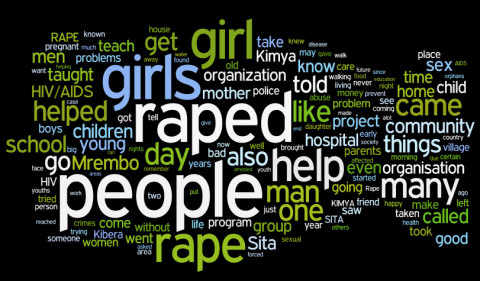
By NANFUMA ELIZABETH
As Ugandan women prepare to commemorate sixteen days of activism against violence on women this November, we revisit the issue of rape reflecting on the why or how it is a social problem, the community legislature and judicial approaches to combating this problem together with the characteristics of rapists as described by experts.
Rape is having forceful sexual intercourse with a girl or woman above eighteen years of age. According to the Oxford English Dictionary in Uganda Law Reform Commission publication (2000 p21), rape is an act of forcing a person, especially a woman, to have sexual intercourse against her will. This includes the act of buggering a man or boy against his will. In law, the term “rape” refers to a situation where a man has carnal knowledge of a woman by force, against her will and against her consent. The definition, however, excludes the penetration of the mouth or anus by other part of the body, or by any object used by the rapist to penetrate the victim’s vagina. Where there is no penetration of the penis into the vagina, such an offence is construed as attempted rape. The offence is committed against a woman of eighteen years and above, otherwise it is defilement. Rape is by nature a violent and a degrading act. However, study findings show that it is considered as an act of immorality rather than of violence.
Rape is an immoral act that goes directly against the command of God. Deuteronomy 22:25-28, condemns rapping and this command was meant to protect women and the nation of Israel from committing sinful actions. It also mentioned a punishment the mosaic commanded for a man who raped a woman. The man was to be killed by stoning while the woman was considered innocent. Though the Mosaic Law was for the nation of Israel during the time of Moses, the principle is clear that raping was sinful in the eyes of God and led to the most extreme punishment possible.
The penal code Act (1950) also treats it as a mere act of immorality. It defines rape as unlawful carnal knowledge of a woman or a girl without her consent, or with her consent if the consent is obtained by force or by means of threats or intimidation of any kind, or by fear of bodily harm, or by means of false representation as to the nature of the act, or, in case of a married woman, by personating her husband.
Contrary to the penal code (1950) and the Uganda Law Reform Commission publication (2000), according to Opiyo (2005), in some areas rapping is closely related to cultural practices. In Karamoja, it is permissible for a boy to abduct a girl and rape her as it is a means of testing his manhood. This is also true with the Bagisu who rape after their circumcision. For example, it was cited in the Monitor of 24th to 27th 1995 under the heading “ man rapes 65 years old man” that Mabafe of Mugomba Mpata parish, Ntenjeru sub county in Mukono district on Saturday February ambushed and raped 65 years old woman. The villagers said that the man raped the old woman because being Mugisu who had just recovered from circumcision, he could not immediately sleep with his wife. He had to do from outside according to the Bagisu custom called “Okumala akambe”. These people have a tendency to ignore the law when it clashes with their customs. Their elders also recognize the practice as accepted aspect of everyday life and often no assistance in trying to prevent it. However, this kind of customs is exhibited in a few cultures that it cannot prevent the law from being enacted against this act.
Dr. Bagonza, a consultant obstetrician and gynecologist of Makerere Medical School, the medical complications of rape are numerous. One of them is getting injuries in the genital urinal system like bruises, tears and lacerations of the genital system. It has been estimated that over 50% of victims have some form of injury of the genital system. Bleeding often varies from stains to life threatening haemorrhage. Getting unwanted pregnancies is also another complication and about 1 to 5% of rape cases result into unwanted pregnancies which affect the physical, mental, and psychological conditions of the victims. Acquiring Sexual Transmitted Diseases and Human Immune Virus is also a common problem associated with rapping and many victims have been found to develop a variety of STDs such as gonorrhea, syphilis Chlamydia and trichomoniasis. However, HIV infection takes long to manifest. The psychological complications make the victims to suffer from depression as a result of shame, hopelessness and lowered esteem. The “rape trauma syndrome” includes fear and the denial of psychosomatic complaints such as muscle ache, headache and chronic gastro-intestinal distress. In the long term, the victim suffers sleep disturbances, phobias, suicidal tendencies and sexual dysfunction such as failure of orgasms and altered sexual and emotional responses. Still not avoidable is the infertility and ectopic pregnancies if the infection is not detected early or not properly treated. This is so especially in those individuals who do not reveal that they have been raped.
Raping is an escalating immoral act in the society and the most prevalent one is the marital rape which occurs between a husband and the wife without the latter’s consent or the consent is obtained by force or by means of threats or intimidations of any kind or by fear of bodily harm. The main reason why marital rape is escalating is because there is no specific enactment of the law on marital rape. Consent is presumed for the fact of marriage. Mugerwa, a resident of Masaka says, “my wife must satisfy my sexual need. I do not even want the law in my house.” According to the Uganda Law Reform Commission publication (2000 pp26), the law in Uganda is silent on the question of marital rape although the study findings indicate that it occurs in all districts.
Another form of rape is the police rape which occurs between a policeman and a woman whose consent he has not obtained or rather the consent is got by means of threats or intimidation. Police rape is mostly caused by uncontrollable urge of sex by some men. Since police are coercive by nature, they take this as an advantage. Nakazibwe Mary of Mpererwe, said that another cause of police rape is the uncontrollable urge which is exhibited among police personnel especially at night. She goes ahead to say that this same problem can trigger stranger rape if someone is not careful. Stranger rape is the kind of rape whereby a man unknown to the woman victim, grabs her without her consent and forces her into having sexual intercourse with him.
Gang rape is also another form of sex which occurs between two or more men with an unwilling female. Most men are known to be jealous. They cannot stand the fact of sharing a woman. This is why he may be free to tell the wife about all the girls he has ever accepted into his life but a woman is not given freedom to talk about the men who happened to be her friends. The most cause of gang rape is the use of alcohol and drugs make men loose “breaks”.
Other forms of rape are office rape, genocide rape, ancestral rape which are also caused by indecent dressing, use of pornographic material, revenge exercising superiority powers over subordinates, body language like shaking bums and others.
However, what baffles the society is the ignorance about male rape yet is also exits. It is the kind of rape where a male is the victim. This male sexual victimization includes both rape and sexual violence in general. It has been reported in UK that over 3% of adult males experience non-consensual sexual activities and it mostly take place in refugee camps.
To sustain a conviction of rape, there should be a physical act and lack of consent as developed under the common law and the case law. The prosecution has to prove beyond reasonable doubt that there was penetration of the vagina by the penis without the consent of the woman and the man knew or was reckless as to whether the woman was not consenting.
Rape as a sexual abuse has continued to represent one of the rapidly growing reported violent crimes all over the world. South Africa is rated the highest with rape cases. According to Schneider (1997) and Reuters (1997) in Eluzai (1997), in Uganda hardly a day passes without a report of rape in the media. Kabuye (1996) in Eluzai (1997) also noted that between 20,000 and 30,000 people living in Kampala today have been subjected to some kind of sexual abuse.
Although the number seems to be high, according to Rape, Abuse and Incest National Network, 60% of sexual assault are not reported to the police. 97% of the rapists do not spend a day in jail and approximately 2/3 of assaults are committed by someone known to the victim. Males have an added burden of facing a society that doesn't believe rape can happen to them at all. Unless there are serious physical injuries, it is difficult for a male victim to report a sexual assault that was experienced by him especially in a society with strong masculine custom. Also the male victims may be very vague in explaining their injuries when they're seeking medical or mental health services.
Due to the dangers of rape, countries have tried to take initiatives of combating this immoral act in the society by enacting laws which stipulate punishments or fines for those who would fall victim. In Uganda, the penal code act, 1994 section 118, confines any person who commits the offence of rape liable to suffer death. The offence of attempted rape is defined under section 119 and a penalty of life imprisonment is prescribed. Prior to the 1990 amendment, rape was punishable by life imprisonment with or without corporal punishment. However, the amended penal code statute modified this penalty by introducing death as the maximum penalty. This amendment in effect removed the jurisdiction from the chief magistrate’s court to the high court.
Since most of the rape victims remain silent after the act for fear of embarrassment, health providers should be educated beyond the health care provision of these victims by being familiar with the sexual offences law and other appropriate legislation which could play an important role in reducing the sexual assaults. This could encourage victims to report rape through improved emotional care.
The author is an MA student at the Department of Journalism and Communication
- Log in to post comments




